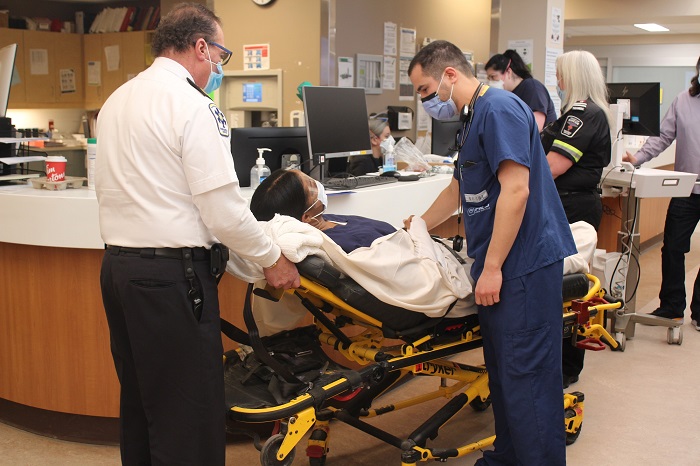Stroke patients at GBGH now have access to important new treatment protocol

On February 15, Georgian Bay General Hospital (GBGH) conducted a mock exercise to test the process for a new stroke protocol which ensures patients have access to important and timely treatment within four to 24 hours of stroke onset. The process includes assessment at GBGH via CT scan and transfer to a GTA stroke centre for endovascular therapy to remove the blood clot causing the stroke. Access to this treatment provides the gold standard of stroke care to patients in our community.
February 22, 2022 – Effective February 22, Georgian Bay General Hospital (GBGH) will offer patients a new extended treatment protocol to ensure timely care for patients suffering from an acute stroke. Through the new protocol, GBGH will assess patients for a possible stroke at the hospital and coordinate their transfer to a facility where they can receive this important treatment, previously not available at GBGH, to reduce the effects of a stroke.
This new process will be available for patients who arrive at the hospital’s Emergency department with signs of a stroke occurring in the previous four to 24 hours. These patients will be assessed via CT scan and if a stroke is confirmed, arrangements will be made to quickly transfer the patient to a stroke centre in the Greater Toronto Area. At the stroke centre, they will be considered as a candidate for Endovascualar Therapy (EVT), using a catheter to remove the blood clot causing the stroke. Admitted patients who suffer a stroke while at GBGH will also be eligible for transfer based on timing.
“The common theory when it comes to stroke response is ‘time is brain’, referring to the importance of quick action in recognizing the signs of stroke and seeking treatment,” says Angie Saini, vice president of Clinical Services and chief nursing executive, GBGH. “At GBGH, we are now able to facilitate the transfer of patients to a stroke centre where they can receive EVT to remove the blood clot causing the stroke. Having access to this additional treatment option is so important for people in our community who suffer from stroke.”
Beyond 24 hours after a stroke occurs, treatment options are vastly reduced for stroke patients, making time so critical in reducing the long-term effects of stroke. For every minute delay in treating a stroke, the average patient loses 1.9 million brain cells.
Prior to four hours (0 – 4 hours) from stroke onset, patients can be treated with tissue plasminogen activator (tPA), a drug used to break down a blood clot and restore blood flow to the brain. This treatment is highly effective, but must be delivered within several hours of the stroke occurring. It is only available in larger regional hospitals, not in community hospitals like GBGH. For patients suspected of having a stroke and being eligible for tPA treatment, they are taken directly to a tPA hospital by paramedics. In the Simcoe Muskoka region, patients are taken to Royal Victoria Regional Health Centre in Barrie for tPA.
Recognizing the signs of stroke early can reduce the time between stroke onset, contacting 9-1-1 and arrival at a hospital emergency department to be assessed and receive appropriate treatment. The Heart & Stroke Foundation encourages people to look for the signs of stroke and act FAST to ensure life-saving treatment can begin as soon as possible.
- FACE – is it drooping?
- ARMS – can you raise both?
- SPEECH – is it slurred or jumbled?
- TIME – to call 9-1-1 right away
According to the Heart & Stroke Foundation, there are an estimated 62,000 strokes – or one every nine minutes – in Canada each year. Stroke is a leading cause of death in Canada and a major cause of adult disability (https://www.heartandstroke.ca/what-we-do/our-impact/saving-lives#:~:text=Each%20year%20in%20Canada%2C%2062%2C000,for%20stroke%20and%20cardiac%20arrest).
Contact:
Jennifer Moore
Director, Communications & Stakeholder Relations
Georgian Bay General Hospital
705-526-1300 ext 5177

